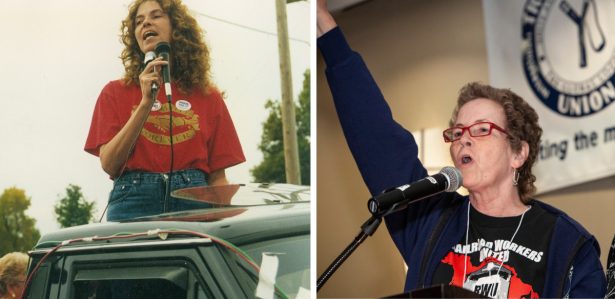This week the U.S. labor movement lost its best-known and best-loved troubadour: the great folksinger-songwriter Anne Feeney. She died of Covid on February 3, at age 69, with her children at her side. With her fantastic songs and feisty spirit, she made an incalculable contribution to the movement. She is irreplaceable, and gone too soon.
Feeney’s beloved original anthems like “Have You Been to Jail for Justice?” and “War on the Workers” and rocking renditions of classics like “Union Maid” and “Solidarity Forever” are staples of the picket-line playlist. Her frequent touring partners Evan Greer and Chris Chandler wrote:
Starting in 1987–when she was inspired by Faith Petric to quit her job as an attorney and dedicate her life to touring and making music in support of workers–Anne played more than 4,000 shows across North America and Europe. She performed for striking workers on countless picket lines, in union halls, and at some of the largest protests of the last century, including the protests that shut down the WTO in Seattle in 1999 and the March for Women’s Lives in 2004. Her performance at the WTO was featured in the documentary This is What Democracy Looks Like. She organized dozens of tours supporting various causes, including the Sing Out for Single Payer Healthcare tour in 2009, and raised tens of thousands of dollars for strike funds and progressive causes.
A memoriam from the Electrical Workers (UE) recalls:
Feeney told the UE NEWS in 2017, “I love going to picket lines,” and she could often be found wherever workers were in struggle. She played at a 1982 UE Local 610 rally in Swissvale, PA during their historic 6 1/2 month anti-concession strike against Wabco (now Wabtec). She played at rallies in North East, PA supporting Local 684’s first-contract struggle, and in Erie, PA sponsored by Locals 506 and 618 during national GE contract negotiations. She served as “minister of culture” for several high-profile national strikes and lockouts, including the Staley strike in the “War Zone” of Decatur, IL and the Frontier Casino strike in Las Vegas, both of which went on for six years.
Feeney also contributed to UE organizing efforts at the GE facility in Parkersburg, West Virginia in the early 1990s, writing and recording a song about Parkersburg workers’ struggle for a VHS tape produced by UE that was mailed to every worker.
She sang for steelworkers, carwash workers, miners, strawberry workers, railroad workers, anti-sweatshop activists, homeowners fighting foreclosure, public transit supporters, auto workers opposing NAFTA, and many more. She sang on the steps of Berkeley’s main post office when activists built a tent camp to keep it open. She sang at the 2011 Wisconsin Uprising, and at the subsequent Solidarity Singalong, where activists braved arrests in a daily singing protest in the capitol rotunda.
She sang at many Labor Notes Conferences, and at every convention ever held by the rank-and-file group Railroad Workers United, and she was a regular at the annual Great Labor Arts Exchange. In 2005, she received the Joe Hill Award from the Labor Heritage Foundation for her lifetime achievements integrating arts and culture in the labor movement.
A FIERCE ADVOCATE
Feeney released 12 albums and performed with such artists as Pete Seeger, Loretta Lynn, John Prine, Toshi Reagon, the Indigo Girls, and Billy Bragg. She was a fierce advocate for more music and arts—and better treatment for musicians and artists—in the labor movement, telling UE News:
I can’t even imagine the civil rights movement without singing. I can’t imagine the early CIO days without singing. Music instills power and bravery. Those kids, sweating in those Alabama churches, singing We Shall Not Be Moved, then walking right out into a barrage of police dogs and fire hoses. It’s the music that allowed them to face all of that, and build the movement and change the world, in my opinion… It will be a more exciting movement when labor arts and culture gets the respect it deserves from labor unions.
After Pete Seeger persuaded her to get more active in the Musicians Union (AFM), she became president of the Pittsburgh Musicians Union—the first female president of any U.S. musicians local. Later she was one of the catalysts who helped form AFM Local 1000, the traveling musicians local, which allowed touring folk musicians to earn a real pension for the first time.
The granddaughter of an Irish immigrant mineworkers organizer, Feeney loved Ireland and its music, and led annual singing tours there. When she wasn’t on the road, she lived in Pittsburgh, where she also co-founded Pittsburgh Action Against Rape. She was a two-time survivor of cancer; to defray her health care costs, supporters organized benefit concerts and in 2016 a tribute album.
Musician, friend, and photographer Bev Grant has compiled a touching tribute video featuring Anne’s singing and photos from throughout her life, including many picket-line snapshots.
In lieu of flowers, her children ask supporters to make a donation in her honor to the Thomas Merton Center, a social justice activist hub in Pittsburgh.
SUPPORT LABOR NOTES
BECOME A MONTHLY DONOR
Give $10 a month or more and get our "Fight the Boss, Build the Union" T-shirt.


Spread the word